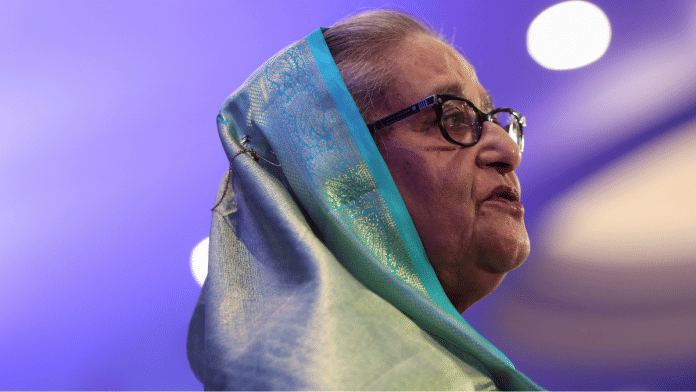New Delhi: Reacting to a special court’s order sentencing her to death for ‘crimes against humanity’, former Bangladesh Prime Minister Sheikh Hasina Monday “wholly denied” the allegations against her and said the ruling was “biased and politically motivated”.
In a statement released by her party, the Awami League, Hasina said the death penalty order revealed a “brazen and murderous intent of extremist figures” within the interim government of Mohammad Yunus and accused the tribunal of being presided over by “an unelected government with no democratic mandate”.
Hasina has been living in exile in New Delhi since last year, when she fled Dhaka following a student uprising that turned violent. She was being probed for her government’s actions during the July-August 2024 protests, when an estimated 1,400 people—most of them students and youngsters—were allegedly killed.
Bangladesh’s domestic war crimes court, called the International Crimes Court, Monday concluded a months-long trial on Hasina’s role in the crackdown and found her guilty on counts of incitement, order to kill and failing to take action to prevent atrocities.
The court, which tried her in absentia, also sentenced her former interior minister Asaduzzaman Khan Kamal to death, and awarded five years’ jail term to former inspector general of police Chowdhury Abdullah Al-Mamun.
Hasina, in the statement, said she “mourns all the deaths” that were reported “on both sides of the political divide”.
Challenging the Yunus government of bringing the charges against her before the International Criminal Court in The Hague, Hasina said she was “not afraid” to face her accusers in a “proper tribunal” where “evidence can be weighed and tested fairly”.
The former PM defended her government’s actions as having been taken in “good faith” to preserve order and protect lives, but acknowledged they had “lost control of the situation” during the unrest.
She added that students had been “permitted to protest freely” and that she had accepted their demands.
Further, Hasina accused the Yunus-led government of assaulting religious minorities in Bangladesh, locking up journalists and suppressing women’s rights. She said Yunus came to power “unconstitutionally”.
After the Bangladesh court’s order, the country’s ministry of foreign affairs said in a statement it was an “obligation” for India to hand Hasina over to Dhaka under the extradition treaty signed by the two countries. New Delhi responded, saying it will hold discussions with all stakeholders and remains “committed to the best interests of the people of Bangladesh”.
(Edited Prerna Madan)
Also Read: Sheikh Hasina is no Dalai Lama, India must stop supporting her. China is cosying up






